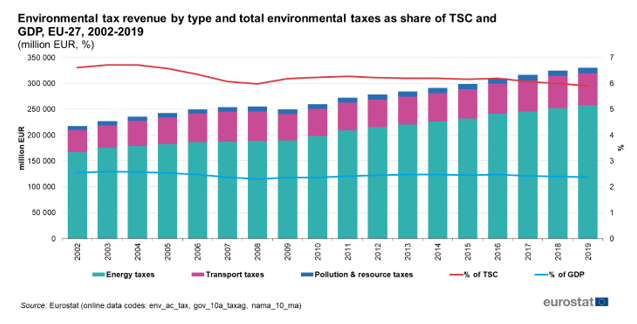What is an environmental tax and what is its purpose?
First of all, attention should be paid to the ecological trend that surrounds us. Recently, significant progress has been noted in industries promoting green solutions in their activities. This not only brings additional benefits in terms of making the public aware of the essence of caring for their own environment, but also affects the desire to pursue new opportunities for environmental support.
To this end, Member States have taken various steps in recent years to ensure adequate and sustainable development for their countries. One of them is the so-called ecotax.
Let us point out that the tax is a tool of the state that entitles us to carry out a certain action, in this case, the aim is to ensure ecological order and to solve environmental problems. The imposition of such financial obligations is intended to support taxpayers’ responses to the area concerned and to draw attention to the nature of progressive, negative changes, including climate which may contribute to raising public awareness of the need to seek sustainable development.
In order to raise the issue of the concept of an environmental tax, attention should be paid to Regulation No 691/2011 of the European Parliament and of the Council of 6th July 2011 on European environmental economic accounts, where an environmental tax as defined in the Regulation, it is a tax or charge in which the taxable amount is a natural entity (or equivalent to a physical unit) of something that has a proven negative impact on the environment and which is considered a tax under ESA 95.
In view of the foregoing, it can be specified that the broadly understood environmental tax relates to the taxation of certain activities, goods or services ultimately as an environmental cost. Moreover, its aim is to target final consumers and producers for actions that will result in increased respect for the environment.
Both European statistics and legislation distinguish four different areas of so-called environmental taxes, which focus on categories such as energy, transport, pollution and natural resources. Energy taxes, which are the main source of EU environmental tax revenues, should be placed first, as they accounted for the largest share of revenues in 2018 (up 77.7%). The main reason for m.in is the imposition of a tax normally on energy products, i.e. coal, natural gas, electricity or petroleum products.
On the other hand, as far as transport taxes are to be achieved, it should be pointed out that those taxes are closely linked to the use of motor vehicles. It is estimated that in 2018 they represented the second most income tax in the EU (19.1%)[1].
Attention should also be paid to the aforementioned taxes on pollution or natural resources, which may include m.in. taxes on the extraction of raw materials or waste management, but this part represents only 3.3% of the revenue from all environmental taxes in the Union in 2018.
‘Greening’ the tax system in the EU
In this regard, it is worth distinguishing the issue of tax collection from EU countries, which can raise the issues of the relevance of the environmental tax and the possibilities offered by the existence of that tax. In Germany, Italy and France, for example, tax collection to improve the quality of the environment amounts to around EUR 50 billion per[2]year. In Poland, this figure reaches 2.7% of GDP, which is slightly higher than the EU average.
According to the analysis, in 2019 the total EU revenue from environmental taxes amounted to EUR 330.6 billion, representing 2.4% of EU GDP and 5.9% of total EU budget revenue from taxes including social security contributions, as confirmed by the chart below[3].
Accordingly, there is an upward trend in EU income from environmental taxes. The evolution of environmental policy in EU countries, as well as the growing awareness of the citizens themselves and the willingness to participate in any action that may protect them from the future negative effects of environmental degradation, undoubtedly have a significant impact here. Ecology is becoming an important part of action in the Member States and the environmental taxes implemented are primarily intended to influence changes in the behavior of operators (including consumers and producers) who have a significant impact on environmental pollution. Such solutions will strengthen future environmental policies, which in the future have the potential to achieve sustainable development in the world. Environmental taxes are merely an incentive-based tool to explore different environmental solutions. Given the scale of the income they generate, taxes have a chance to help protect the environment in the long run, which can improve the quality of our natural economy.
It should be noted that on 1st January 2019 the so-called emission fee was introduced in Poland, which is to be one of the tools of the fight for cleaner air. In particular, operators who place domestic motor fuel on the domestic market are required to pay for it. This fee was initially intended to feed the Low Emission Transport Fund (hereinafter: FNT), which was supposed to develop electromobility in Poland, but as we read from the amendment of the Act of 14th August 2020 amending the Act on biocomponents and liquid biofuels and certain other laws, FNT was abolished on 30th September 2020 and replaced by the National Fund for Environmental Protection and Water Management. It is worth adding, however, that the emission levy can support not only the development of renewable fuels, but also the construction of charging infrastructures for electric vehicles.
[1]https://ec.europa.eu/eurostat/statistics-explained/index.php?title=Environmental_tax_statistics_-_detailed_analysis#Energy_taxes_stand_out_as_the_major_source_of_EU_environmental_tax_revenue
[2]https://www.obserwatorfinansowy.pl/bez-kategorii/rotator/oko-na-gospodarke-miliardy-w-ekologicznej-kieszeni-fiskusa/
[3] https://ec.europa.eu/eurostat/statistics-explained/index.php/Environmental_tax_statistics


